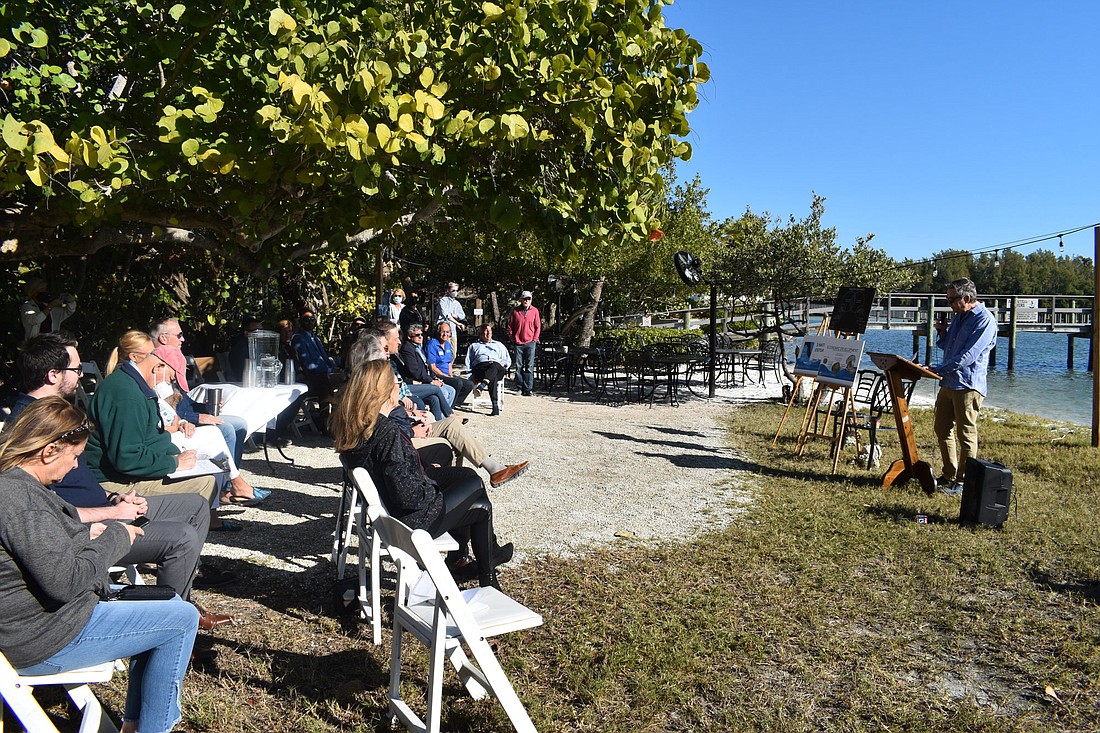- February 20, 2026
-
-
Loading

Loading

Chiles Group CEO and Gulf Shellfish Institute Board Member Ed Chiles had quite the backdrop to announce the launch of a five-year initiative to help restore three national estuaries.
On a sunny Saturday morning, Chiles announced the launch of “All Clams on Deck” at his Mar Vista Dockside Restaurant in Longboat Key. It is Chiles’ plan to raise a total of $22.5 million for the environmental betterment of Charlotte Harbor, Sarasota Bay and Tampa Bay.
“We will look at all of the areas in these three national estuaries, and say, ‘Where is the best area for clams?' and 'Where is the best area for seagrass?’” Chiles said. “We don’t want to put seagrass in an area where it doesn’t have a great chance of being successful.”
All Clams on Deck seeks to get support from the federal government, state government, nearby municipalities and Tampa Bay area residents to restore 650 acres of seagrass. The idea is to strategically plant nursery-grown seagrass into areas where it’s died off. The group also seeks to create 30 high-density clam restoration sites.
It is Chiles’ goal to obtain $15 million from the federal government and $2.5 million in state funding to accomplish the initiative.
Chiles said the initial plan is to evenly split the $15 million in federal money between the three estuaries. He said once more data is collected, scientists will help determine which areas need more care.
“We’re going to show that how this community used its intrinsic resources to deal with the problems, and we’re going to be a model for people to go back to their communities and say, ‘This is what we have in our community that we can do to address this issue,’” Chiles said.
Chiles said he’s been working to launch All Clams on Deck since April 2021. He said he could hear within the next 90 days about whether the Gulf Shellfish Institute receives the $15 million in federal support. Chiles said he would seek the advice of the group’s federal lobbyists on the best course of action.
Two Republican members of the Florida legislature — State Sen. Jim Boyd and State Rep. Will Robinson — spoke during Saturday morning’s announcement.
“It kind of started after the Piney Point issue that Rep. Robinson and I worked very hard on getting the money to fix and close that forever, and I’m very happy we were able to do that,” Boyd said.
Robinson also said it’s important to prioritize high water quality.
“To Floridians, I think it’s one of the premier bipartisan issues in the legislature, something we all agree on,” Robinson said. “And to me, this is a great bipartisan project.”
Robinson reflected on his Saturday drive into Longboat Key.
“Folks save the entire year to come to our beautiful shores and our beautiful beaches,” Robinson said. “And folks like Ed and Sen. Boyd and all of us here that live here because of our great water.
“And, it’s one of those issues that we’ll never solve. We’ll never stop working on water quality.”
Several local leaders attended Saturday’s event, including Longboat Key Mayor Ken Schneier, Longboat Key Vice Mayor Mike Haycock and Solutions to Avoid Red Tide CEO Sandy Gilbert.
Chiles said he urged nearby municipalities and individual residents to contribute funding toward All Clams on Deck.
“My heart is in this because I grew up here,” Chiles said. “My pocketbook is in this and all of us are in this because this is everybody’s business.”
Since last year, Sarasota Bay Estuary Program Executive Director David Tomasko has spoken with the Observer about more than 2,000 acres of lost seagrass in Sarasota Bay alone.
Tomasko mentioned three reasons about the importance of having a healthy bay: Quality of life; the local economy and the example of the East Coast's Indian River Lagoon and its poor environmental health and starving manatees
“(It was) literally the worst year on record for manatees. (More than) 1,000 of them dead, more than 10% of (the) population, and the main reason why (2021 was) such a bad year is they’re starving to death in the Indian River Lagoon because their seagrass resource, their food, is down 95% because the water quality has gotten so bad,” Tomasko said. “And that is just not what I don’t think anyone in Sarasota Bay wants to see. Sarasota Bay become the next Indian River Lagoon.”